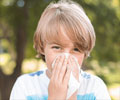According to scientists childhood allergies are increasing around the world, even in several developing countries where asthma, hay fever and eczema have become serious public health issues.
Asthma, especially, is responsible for many children missing school, being hospitalized or even dying.Although the underlying cause of the condition is known to be inflammation of the airways, it is still unknown what exactly triggers the problem and why some people are affected while others are not.
However it has been noted that young children are suffering more and more allergic disorders with a notable increase in the past decade.
The International Study of Asthma and Allergies in Childhood conducted in 1991 was also repeated by the same researchers in 2002 and 2003 only to find that there was a widespread increase in prevalence of these diseases in 56 countries, especially among young children.
The details of the study were published in the latest edition of the Lancet medical journal. The researchers surveyed parents of 193,000 children aged 6-7 years and 305,000 children aged 13-14 years in different countries like South Africa, Canada, Sweden Brazil and Iran.
The maximum increase was noted in eczema among the younger children and for hay fever in both age groups. However it was found that in the older age group where there was an increased prevalence of asthma there were some signs of decrease.
Advertisement
He said, 'Although changes in mean annual prevalence to the order of 0.5 percent might sound small, such changes could have substantial pubic health implications, especially since the increases took place most commonly in heavily populated countries.'
Advertisement
In fact the Lancet suggested that given the diversity of the condition, asthma was in fact unlikely to be a single disease and therefore the term should be abolished altogether.
The benefits of a combination of medicines in tackling asthma was also shown in a separate study.
According to Dr Klaus Rabe of Leiden University in the Netherlands who conducted a 12-month study involving more than 3,000 people, showed that giving asthma patients a top-up dose of AstraZeneca's
These patients were already on a maintenance dose of Symbicort.






